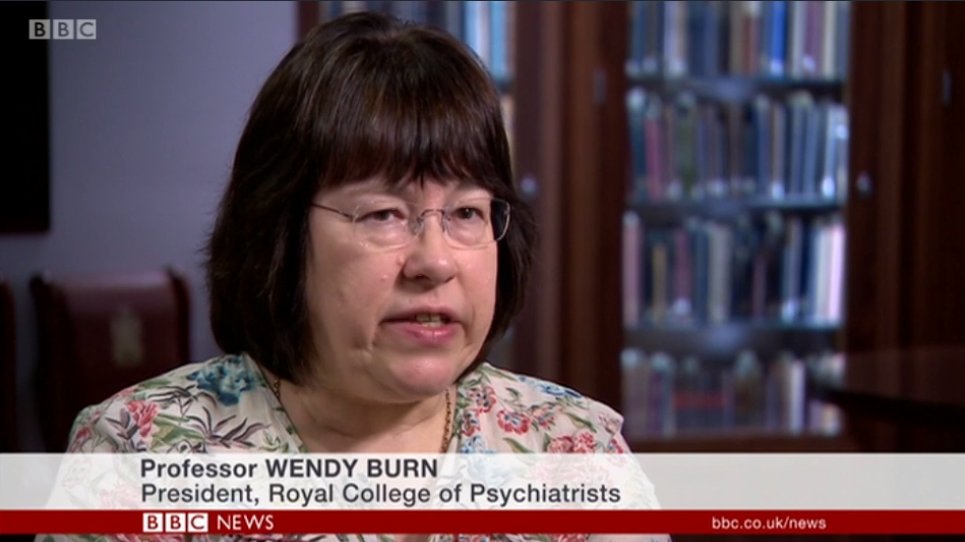A new and groundbreaking opinion piece published in The BMJ Opinion (the British Medical Journal’s blog) urges the medical community to provide support and help to those withdrawing from antidepressants.
Written by Wendy Burn, who is the former president of the Royal College of Psychiatrists (RCPsych), this piece marks a step toward the medical community’s acknowledgment of the potential harms of antidepressants. Burn also announces the launch of a new RCPsych Patient Information Resource on how to come off these drugs.
 Service user groups and patients worldwide have fought for decades for the psychiatric community to realize that antidepressants can have severe and long-term withdrawal effects. Even experts have noted that service user input is essential in creating guidelines for coming off antidepressants.
Service user groups and patients worldwide have fought for decades for the psychiatric community to realize that antidepressants can have severe and long-term withdrawal effects. Even experts have noted that service user input is essential in creating guidelines for coming off antidepressants.
Last year their efforts reached fruition as UK’s National Institute for Care and Health Excellence (NICE) changed their guidelines to acknowledge that antidepressant withdrawal can be long-lasting and severe. This guidelines update was in response to a freedom of information request, which challenged the earlier evidence that withdrawal was short-lived and mild.
Over the past two years, an increasing amount of evidence has emerged around the harms caused by antidepressants and their withdrawal. Often what appears to be a relapse of depressive symptoms is actually a consequence of antidepressant discontinuation; this can, in turn, lead to chronic use of antidepressants. The life-threatening effects of polypharmacy and chronic psychiatric drug use have become a matter of concern to the global medical community.
Burn begins the opinion piece sharing her experience after co-signing a letter to The Times in 2018; the letter noted that antidepressant withdrawal was mild and short-lived – mostly resolved within two weeks. In her own experience, patients had not reported adverse experiences after antidepressant discontinuation – something she attributes to a practice of advising patients to taper off slowly.
She then speaks about the letter’s aftermath, where her views and assertions were challenged by patients, service user groups, and other psychologists and psychiatrists. The aforementioned freedom to information request, along with formal complaints and social media furor, led Burn to re-visit her judgment and assumptions.
Burn set out to learn more about this by speaking with the service user and survivor groups who called themselves the “prescribed harm community”; this included Altostrata, which is a forum that provides peer support to those tapering off antidepressants. She also met with groups such as “Drop the Disorder,” which contests the premature use of psychiatric diagnosis.
She realized that RCPsych’s position, much like that of the wider medical community, had underestimated the severe and long-lasting effects of antidepressant withdrawal. With a patient-centered outlook, she and others set out to correct their understandings. Burn states the following change in their position reflects this outlook:
“Whilst the withdrawal symptoms which arise on and after stopping antidepressants are often mild and self-limiting, there can be substantial variation in people’s experience, with symptoms lasting much longer and being more severe for some patients. Ongoing monitoring is also needed to distinguish the features of antidepressant withdrawal from emerging symptoms, which may indicate a relapse of depression.”
The change in NICE guidelines was a consequence of this change in the position of the Royal College of Psychiatrists. The current position urges that support be provided to those coming off antidepressants. Resultantly, the college has opened a Patient Information Resource that will provide relevant information and help patients to come off antidepressants carefully.
Burn notes that the resource is written by “a pharmacist and a psychiatrist with their own personal, as well as professional, experience of withdrawal symptoms, along with input from multiple stakeholders.” The resource includes free information on tapering plans, types of symptoms, information on the difference between relapse and withdrawal, etc.
While this is a groundbreaking and promising step, it remains to be seen how it will resonate with the wider psychiatric community. Despite Burn’s remarks on slow tapering, a recent review of documents showed that even with slow tapering, antidepressant post-withdrawal disorder could continue until a year after discontinuation.
****
Burn, W. (2020, September 25). Wendy Burn: Medical community must ensure that those needing support to come off antidepressants can get it [Blog Post]. (Link)















Thanks Ajurdhi
“Whilst the withdrawal symptoms which arise on and after stopping antidepressants are often mild and self-limiting, there can be substantial variation in people’s experience, with symptoms lasting much longer and being more severe for some patients. Ongoing monitoring is also needed to distinguish the features of antidepressant withdrawal from emerging symptoms, which may indicate a relapse of depression.”
So of course we have that clause “relapse of depression” which results in more drugging and please let’s not refer to them as “antidepressants”. No such thing exists and we should honestly not ever partake in unsubstantiated regurgitation. It suggests that there are pills out there that “work on” “depression” \
The REAL question is. With this knowledge, why are people put on the chemicals if they are known as poisons and brain/body wreckers?
And no, the same NICE recently suggested to the medical community to drug chronic ailments with psych chemicals, so no one’s interest is REALLY about helping people withdraw.
Where do people go for “withdrawal”? To withdrawal communities who work DAMN hard to help in real time, with real care and support. Communities rife with actual knowledge, common sense and above all, honesty.
Report comment
I’m bothered by the term “expert”. Expert in what? Expertise implies that someone has knowledge within a particular field, about the thing that the field is about. It implies that it is knowledge others do not have. This field of psychiatry used to use that knowledge to cut parts out of brains, or keep people shackled. They cut parts out even though they had no clue where the symptom came from. 60 years later, they are even further away from being experts. They now use chemicals that slowly carves out parts of brains and are still shackling people if they object to these chemical surgeries.
We should never confuse knowledge with power. The brain, as space is infinite. A child has as much useful knowledge about space than does the most expert scientist. The child does not know the language, but it has the same curiosity.
So it is very natural to look at the weirdness in front of you, but to make up hypothesis about this thing is not fact. “researchers” dupe the public by studying the brain, and gullible people think that study is knowledge. It is high time for researchers to abandon the field, or at least tell the public that psychiatry should NOT be throwing chemicals into such a vast and unknown area. A true expert would never do this.
Report comment
And I imagine that some in that withdrawal phase are at risk of committing violent acts, including mass killings. Although 90+% of all mass shooters/killers are already known to have been on AD’s or only very recently come off them, I think it’s time to look further into their history’s going back at least a month or two.
Report comment
Stimulants have also been implicated in a number of mass shootings, though much less often than “antidepressants.”
Report comment
My father taught me to pay attention to the “ex” in “expert”. He told me that the knowledge, etc. of the “expert” was all “past history” and that more than the “expert” had very probably not updated their knowledge and education since their college, graduate, or professional days, etc. Thank you.
Report comment
Good point.
Also anyone who claims to be right because he is an expert probably lacks expertise, while anyone with expertise will explain why they are right instead of claiming to be an expert.
Report comment
Very well said!
Report comment